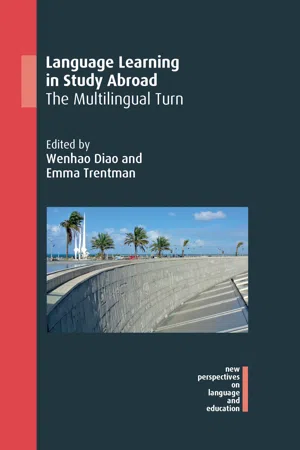
Language Learning in Study Abroad
The Multilingual Turn
- 240 pages
- English
- ePUB (mobile friendly)
- Available on iOS & Android
Language Learning in Study Abroad
The Multilingual Turn
About this book
Vestiges of monolingual bias are present in the portrayal of study abroad as an idealized monolingual immersion experience and the steps many programs take to encourage or enforce target language monolingualism.In reality, study abroad is often inherently multilingual. This book addresses the need for a recognition of the multilingual realities of study abroad across a variety of traditional and non-traditional national contexts and target languages. The chapters examine multilingual socialization and translanguaging with peers, local hosts and instructors; how the target language is necessarily entwined in global, local and historical contexts; and how students negotiate the use of local and global varieties of English. Together the chapters present a powerful argument for scholars and study abroad practitioners to consider and critically incorporate multilingual realities into their research and planning.
Tools to learn more effectively

Saving Books

Keyword Search

Annotating Text

Listen to it instead
Information
Table of contents
- Cover-Page
- Half-Title
- Series
- Title
- Copyright
- Contents
- Acknowledgements
- Contributors
- Introduction: Multilingual Approaches to Language Learning in Study Abroad
- 1. Ghanaian Multilinguals on Study Abroad in Tanzania: Learning Swahili through Akan/Twi and Cultures of Storytelling
- 2. When the Foreign is Familiar: An Afro-Dominican-American Woman’s Experience Translanguaging Race, Ethnicity and Cultural Heritage Learning Portuguese in Brazil
- 3. An Investigation of L2 Learning Peer Interactions in Short-Term Study Abroad
- 4. Monolingual Expectations and Plurilingual Realities in Arabic Study Abroad
- 5. Language Use, Class and Study Abroad in China
- 6. ‘Sorry, I don’t speak any English’: An Activity-Theoretic Account of Language Choice in Study Abroad in South Korea
- 7. Study Abroad as a Transformative Translanguaging Space for Heritage Speakers of Spanish
- 8. Encountering Multilingualism in Study Abroad: Sojourners’ Orientations to Linguistic Diversity and Language Hierarchies in Barcelona
- 9. Research on Language Learning during Study Abroad: What Next?
- Index
Frequently asked questions
- Essential is ideal for learners and professionals who enjoy exploring a wide range of subjects. Access the Essential Library with 800,000+ trusted titles and best-sellers across business, personal growth, and the humanities. Includes unlimited reading time and Standard Read Aloud voice.
- Complete: Perfect for advanced learners and researchers needing full, unrestricted access. Unlock 1.4M+ books across hundreds of subjects, including academic and specialized titles. The Complete Plan also includes advanced features like Premium Read Aloud and Research Assistant.
Please note we cannot support devices running on iOS 13 and Android 7 or earlier. Learn more about using the app